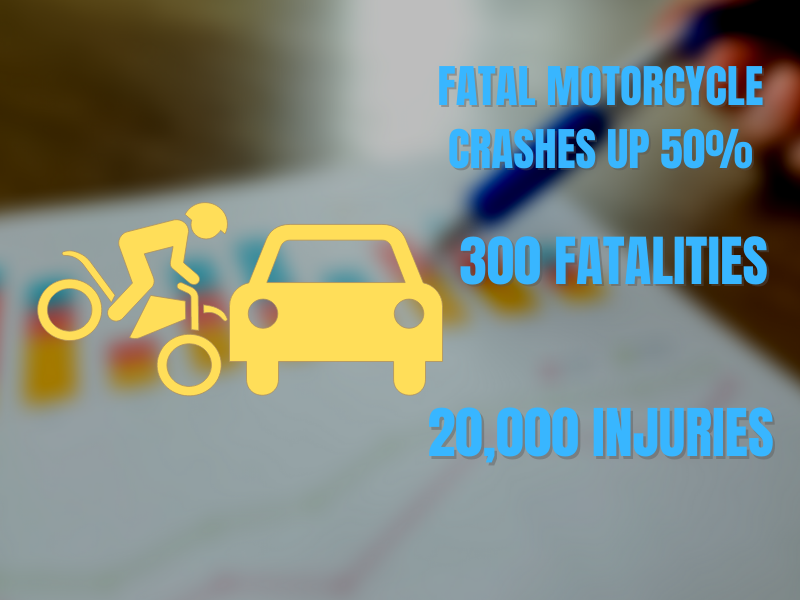Although motorcycles only make up a small number of registered vehicles in Canada, they’re over represented in accidents every year. Recent motorcycle accident statistics from the BC Coroners Service found the number of fatal crashes increased by 50 percent in a recent decade.
Motorcycle accidents are frequently more severe than car accidents because motorcycles are smaller, less visible, and offer less protection to riders and passengers compared to occupants of other vehicles. More severe injuries usually mean higher medical bills and more lost income for accident victims. Recovering full and fair compensation can keep victims from falling into crushing debt after a motorcycle accident.
At Warnett Hallen LLP, our lawyers have extensive experience representing motorcycle accident victims in Vancouver and British Columbia. If you suffered injuries in a crash, call or contact us today for a free initial consultation.

How Often Do Motorcycle Accidents Happen in Vancouver?
According to statistics from Transport Canada, motorcycles make up about three percent of all registered vehicles in Canada. But nationally, motorcyclists made up about 10.6 of all traffic fatalities in a recent year and accounted for 12.2 percent of all serious injuries.
Looking at a 10-year overview from the Government of British Columbia, the high number of injuries and deaths is a definite trend. The most current data shows nearly 300 fatalities and roughly 20,000 injuries in police-reported motorcycle crashes during that timeframe. In just one year, 51 people died in motorcycle crashes, which accounted for about 17 percent of all BC traffic deaths. That same year, almost 1,000 motorcycle accident injuries meant about five percent of all traffic injuries in the province.
Do Motorcycle Helmets Save Lives?
Helmets are often a contentious subject with motorcycle riders. Many claim helmets are uncomfortable, block their vision or hearing, and don’t do enough to prevent injuries to justify wearing them. But evidence shows motorcycle helmets save thousands of lives every year.
One study from the United States found that motorcycle helmets saved more than 1,600 lives in a single year. Other research from the National Highway Traffic Safety Administration (NHTSA) found that wearing a helmet reduced the odds of someone dying in a motorcycle accident by about 29 percent and lowered the risk of a traumatic brain injury (TBI) by about 67 percent.
How to Increase Safety While Riding
Here are a few tips that motorcycle riders can use to help keep themselves safe on the road:
- Always wear a helmet. It’s required by law. Your helmet should also include face and eye protection for additional protection from injuries.
- Wear additional safety gear. Long, thick pants, shirts, and jackets are a good idea when riding a motorcycle because they’ll help protect your body from road rash and other injuries in the event of a crash. Elbow, knee guards, and sturdy boots can also reduce the risk of severe injuries in a motorcycle accident.
- Ride in groups. Motorcycles can be more difficult for others to see because of their small size compared to cars and trucks. Riding in a group makes it easier for other people to see you and avoid hitting you. Group riding also means that if you’re injured in a crash, someone else can call for emergency services if you can’t get help yourself.
- Never ride while impaired. Alcohol, illegal narcotics, and prescription medications can dull your reflexes, impact your ability to think clearly, and affect your perception of the environment around you. All of these factors make a motorcycle accident more likely.
- Rest before you ride. Fatigued driving is a serious problem for motorcyclists and other motorists, as it can decrease reaction times, impact your judgment, and cause you to fall asleep while riding. Caffeine and other stimulants are not a replacement for sleep, so always get enough sleep before riding your motorcycle.
- Avoid distractions. Distracted driving can reduce your awareness of the surrounding environment by as much as 50 percent, making a crash more likely.
- Watch your speed. Speeding makes it harder to keep a motorcycle under control safely. Slamming on the brakes at high speed also increases the chances of a rider or passenger from being ejected from the bike. Slow, gentle stops are always preferable if possible, and staying within posted speed limits is safer for you and your neighboring motorists.
Motorcycle Accidents and Your Legal Rights
In British Columbia, all motorcycle riders must carry basic auto insurance through the Insurance Corporation of British Columbia (ICBC). If you’re involved in an accident, your first step is to file a claim with ICBC so you can claim your no-fault benefits under your policy.
However, if you suffered serious injuries due to someone else’s negligence, you may also be able to file a third-party personal injury claim. A third-party claim allows you to potentially seek compensation for:
- Medical bills and lost wages not covered by your ICBC insurance
- Reduced future earning capacity
- Damaged personal property
- Pain and suffering
- Emotional distress
While ICBC claims work on a no-fault basis, you’ll need to prove fault to claim compensation through a third-party personal injury claim. A Vancouver motorcycle accident lawyer at Warnett Hallen LLP can help determine your legal options and fight for the results you deserve.
Contact a Motorcycle Accident Lawyer in Vancouver Today
Life after a serious motorcycle crash can be personally and financially overwhelming. Let us take the burden off your shoulders and pursue the compensation you deserve for your losses. Call or contact Warnett Hallen LLP today for a free consultation with an acclaimed Vancouver motorcycle accident lawyer.
*Since May 1, 2021, British Columbia operates under a no-fault insurance system for motor vehicle accidents. Under this system, compensation for injuries and losses is handled through your own insurance provider (typically ICBC) regardless of who is at fault for the accident. Please note that the information on this page may not apply to your accident if it occurred after May 1, 2021. This disclaimer does not constitute legal advice.




